This is a guest post from Luke DeSmet, a friend of The Recorder.
In the week after Parks and Recreation aired its series finale, the emotional high faded and my focus shifted to a television landscape still littered with great comedy, including daring and original work like Broad City and Man Seeking Woman. But so far time has not afforded me any critical distance: I love this show, and feel the need to express what an unambiguously positive time I have had with it. This is a show I want to celebrate, not critique. Its impact on television comedy has been overwhelmingly positive, filling our screens with more likeable, human, and even unapologetically decent folks who still manage to be hilarious. Originally presented as The Office transposed into small town government and as a natural extension of the trend of cringe humor, Parks found its feet in its second season and transformed itself into something clear-eyed and earnest while never sacrificing its alt-comedy edge, pulling comedy back from a ledge of cynicism and irony that had become boringly routine.
Fittingly, cynicism and irony had no place in Parks and Recreation’s superb send off. There’s always a risk that these types of celebratory finales become cloying, and with that in mind the episode was kind to the point of bravery, successfully pulling on the heartstrings without descending into schlock. It managed this by being genuine, and not having to fake the heart behind its sentimental moments. Each character reaches a conclusion that is not only heartwarming, but also uniquely fitting. In short, they got everyone right, and here’s how:
Donna:
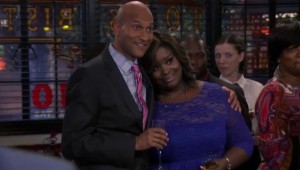 Both Retta and Keegan-Michael Key are inherently likable actors, and the two of them work together so effortlessly they manage to compensate for the fact that the show never really had enough time to develop Joe, and was perhaps too enthusiastic to pair everyone up in the final two seasons. Of any pairing in the show, I think they’re the two I would most want to hang out with. Donna follows in the footsteps of fellow world-beater Bill Gates by being such an endlessly confident boss she has to turn to fixing education with Joe and April in order to find a new challenge. Her turn toward altruism is not a sign of her softening, but rather a natural extension of her strength. And along with Ben and Andy, Joe makes it three male characters on the show who are interesting and passionate in their own right, but also ultimately support even stronger women. They inhabit roles typically consigned to women, and that the show effortlessly reverses that dynamic not as a single one-off token, but in three different relationships, is really refreshing.
Both Retta and Keegan-Michael Key are inherently likable actors, and the two of them work together so effortlessly they manage to compensate for the fact that the show never really had enough time to develop Joe, and was perhaps too enthusiastic to pair everyone up in the final two seasons. Of any pairing in the show, I think they’re the two I would most want to hang out with. Donna follows in the footsteps of fellow world-beater Bill Gates by being such an endlessly confident boss she has to turn to fixing education with Joe and April in order to find a new challenge. Her turn toward altruism is not a sign of her softening, but rather a natural extension of her strength. And along with Ben and Andy, Joe makes it three male characters on the show who are interesting and passionate in their own right, but also ultimately support even stronger women. They inhabit roles typically consigned to women, and that the show effortlessly reverses that dynamic not as a single one-off token, but in three different relationships, is really refreshing.
April and Andy:
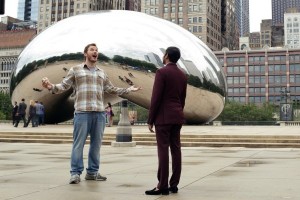 We know through Donna’s story that April comes to head her foundation (and partners on a major education initiative.) Andy, meanwhile, has been in training to be a great dad his entire life. The question of children isn’t the common television trope of April ultimately being overcome by maternal instincts—in both her professional and family lives she feels complete without children. Andy, however, does not. He gave up his own career and moved to Washington, happy to prioritize April’s dreams; the only thing that’s missing is kids. April is resistant, put off by the way children and parenthood are presented as something happy, sentimental and vapid by ‘normal’ people, but realizes that everything she loves—hard-earned loyalty, individualism, idiosyncratic connections, uninhibited expressions of self, will be what characterizes her family, because she and Andy are the parents. April’s career will continue, Andy taking on the role of primary caregiver, both of them forever encouraging their kids to become who they are.
We know through Donna’s story that April comes to head her foundation (and partners on a major education initiative.) Andy, meanwhile, has been in training to be a great dad his entire life. The question of children isn’t the common television trope of April ultimately being overcome by maternal instincts—in both her professional and family lives she feels complete without children. Andy, however, does not. He gave up his own career and moved to Washington, happy to prioritize April’s dreams; the only thing that’s missing is kids. April is resistant, put off by the way children and parenthood are presented as something happy, sentimental and vapid by ‘normal’ people, but realizes that everything she loves—hard-earned loyalty, individualism, idiosyncratic connections, uninhibited expressions of self, will be what characterizes her family, because she and Andy are the parents. April’s career will continue, Andy taking on the role of primary caregiver, both of them forever encouraging their kids to become who they are.
Tom:
Not an emotional conclusion, but with him it was never about a happy-ending success story, and he would be no more happy growing old in a boardroom than Ron. He’ll always be a hustler, always at his best when he’s out there selling himself and closing the deal. The sequel to his book probably won’t be as successful as the first (failing to fail indeed), and he’ll have to find something new. But he will, and he’ll still be treating himself in his ballin’ house and with his sexy lady, forever being Tom.
Garry/Jerry:
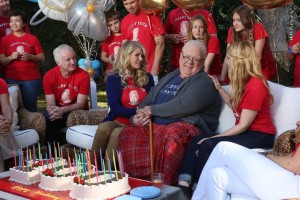 Nothing sums up the progression of the show and its contribution to the television landscape more than this. Originally the Parks’ version of walking punchline Kevin from The Office (whose high point was inadvertently convincing a coworker that he is mentally handicapped), by the end every joke at Jerry’s expense wasn’t really at his expense at all, geared instead at ridiculing the ridiculous pop-culture notion of looking down on a hard-working and kind man who’s ultimately a bit boring. It’s obviously not an accident that the guy whose name nobody could remember is elected mayor by a write-in vote—which clearly happens because he does such a great job. He lives to be 100, beloved by his city and enormous family, his wife never ages, he never has an unhappy day in his life. It’s anti-snark, anti-cynicism, anti-judgment.
Nothing sums up the progression of the show and its contribution to the television landscape more than this. Originally the Parks’ version of walking punchline Kevin from The Office (whose high point was inadvertently convincing a coworker that he is mentally handicapped), by the end every joke at Jerry’s expense wasn’t really at his expense at all, geared instead at ridiculing the ridiculous pop-culture notion of looking down on a hard-working and kind man who’s ultimately a bit boring. It’s obviously not an accident that the guy whose name nobody could remember is elected mayor by a write-in vote—which clearly happens because he does such a great job. He lives to be 100, beloved by his city and enormous family, his wife never ages, he never has an unhappy day in his life. It’s anti-snark, anti-cynicism, anti-judgment.
Jean-Ralphio and Mona Lisa:
These two are always gonna be Jean-Ralphio and Mona Lisa, and thank God for that. But even here Mike Schur and Amy Poehler can’t help themselves: elderly Craig and Typhoon are sharing a bottle of Jean-Ralphio champagne.
Craig and Typhoon:
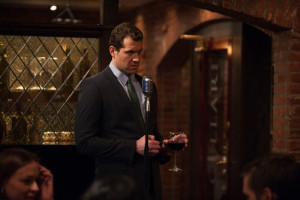 It says something that a secondary and a tertiary character end up with maybe the sweetest ending. Craig learns to control his rage, but not to stop being himself—he will be dramatic and slightly off-balance his entire life, and also, by the way, have a successful career, be a sommelier and jazz crooner, and grow old with a loving husband who won’t regret one ridiculous second. Ron as Typhoon’s best man is perhaps my favorite extra touch of the episode.
It says something that a secondary and a tertiary character end up with maybe the sweetest ending. Craig learns to control his rage, but not to stop being himself—he will be dramatic and slightly off-balance his entire life, and also, by the way, have a successful career, be a sommelier and jazz crooner, and grow old with a loving husband who won’t regret one ridiculous second. Ron as Typhoon’s best man is perhaps my favorite extra touch of the episode.
The City of Pawnee:
Our lovable den of Paunch Burger-loving yokels and day-walking raccoons becomes a thriving tech capital, home to a beautiful national park, and apparently becomes the capital of Indiana and home to the University of Indiana. No wonder Jerry kept winning those elections.
Ron:
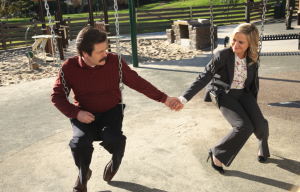 A really beautiful and disarming ending—underneath all the machismo, the bluster, the gruffness, the silly libertarianism, he was a guy who had trouble relating to people, knew he would always be out of place in the way modern society operates and changes, and ultimately just wanted to be at peace, feel at home, be in nature, and do the solitary work that he loves. Parks is clearly a forward-thinking show, one that embraces change and progress, but Ron is a reminder that change often leaves someone behind, people we would be better off to remember. The show was committed to the idea that there’s a place for everyone, but it wouldn’t have been meaningful if they didn’t pull it off. They pulled it off.
A really beautiful and disarming ending—underneath all the machismo, the bluster, the gruffness, the silly libertarianism, he was a guy who had trouble relating to people, knew he would always be out of place in the way modern society operates and changes, and ultimately just wanted to be at peace, feel at home, be in nature, and do the solitary work that he loves. Parks is clearly a forward-thinking show, one that embraces change and progress, but Ron is a reminder that change often leaves someone behind, people we would be better off to remember. The show was committed to the idea that there’s a place for everyone, but it wouldn’t have been meaningful if they didn’t pull it off. They pulled it off.
Ben and Leslie:
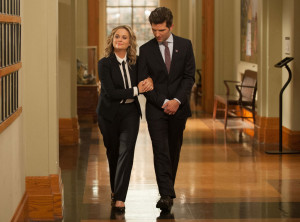 Self-explanatory, and everything that was expected, but pitch perfect nonetheless. He didn’t write it in his childhood journal, but Ben’s a guy who has wanted to be a political leader his entire life. He’s smart, committed, obviously qualified, and has the support he needs to become governor. But Leslie Knope is Leslie Knope, and Ben doesn’t decide to support her as some nice-guy concession, he does it because she’s the leader, always has been, and because he knows it’s the right thing to do. And Leslie does her thing, makes everything work, and will be the greatest damn president in history and will have her face carved into mountains.
Self-explanatory, and everything that was expected, but pitch perfect nonetheless. He didn’t write it in his childhood journal, but Ben’s a guy who has wanted to be a political leader his entire life. He’s smart, committed, obviously qualified, and has the support he needs to become governor. But Leslie Knope is Leslie Knope, and Ben doesn’t decide to support her as some nice-guy concession, he does it because she’s the leader, always has been, and because he knows it’s the right thing to do. And Leslie does her thing, makes everything work, and will be the greatest damn president in history and will have her face carved into mountains.
Again, I claim no critical distance here, and perhaps I’m being too overwrought for the light touch Parks always wielded, but the finale has left me in no mood to apologize for being earnest, because who cares, right? This entire series is an act of human kindness, a labor of love, a defense of goodness, an aspirational and stirring call to arms. And, also, hilarious. I’ll miss it and be grateful for it always.

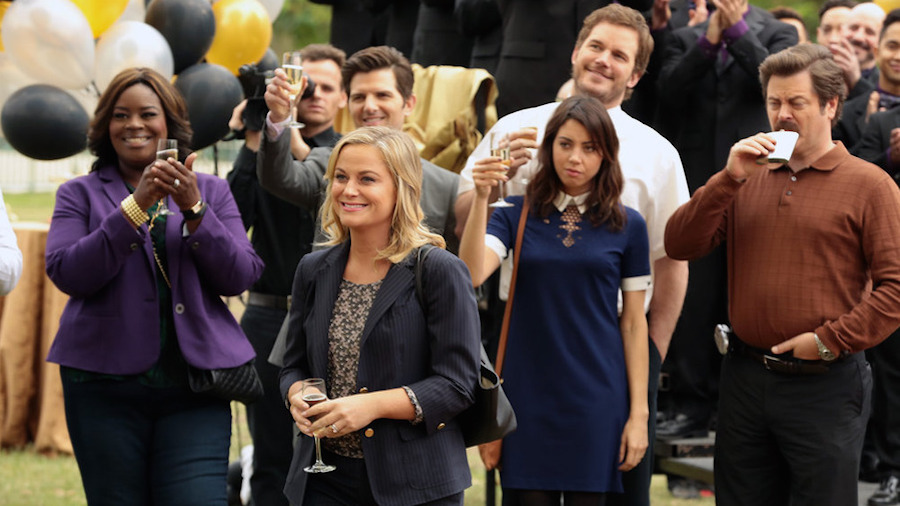





Doesn’t always happen, but they really did nail the series finale here. Parks and Rec will be missed.
Find your team and go to work.